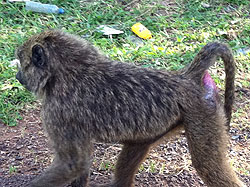We’re glad to be on the road out of Kampala. I almost got caught up in a national anti-malaria colloquium at the Sheraton for which our senior staff was invited to present on short notice. Anthony jumped in to make the presentation, and by about 1 p.m. it appeared there was no point in tossing an American bishop into the mix. So William and I left, and hoped to make it to Soroti shortly after dark.
Besides flying, or driving over open bush, there are two roads from Kampala to Soroti, the heart of the Teso region. One goes west and north through Mbale, famous for its coffee. The road is equally famous for its potholes and construction delays, so we choose instead to head north toward Lira, cross the Nile, then drive east. We immediately run into unreported jams and closures, but after patiently navigating the obstacles, our driver Francis has us sailing on a good road through lush countryside.

We’re in the rainy season and the green of the mango trees, cassava fields, and sawgrass is stunning. We drive for several hours, much of it a long stretch through Lango, William Omara’s tribal area. Just before we cross the Nile, we come across a troop of baboons on the roadside, mingled with a couple dozen black-faced monkeys. Since we’re obviously not eating, they’re not very interested in us.
At one point, William points north. “This is the place where God saved my life,” he said, matter-of-factly.
He was, at the time, a student in a Roman Catholic boarding school about 30 kilometers to the north. In 1996, William was 19, and in his last year. October 9th is Independence Day in Uganda, and the students at the school were allowed a party. The girls came over from their compound; there was an evening of carefully supervised dancing, friendly conversation, snacks and sodas. The children were allowed to stay up very late, with the latest retiring shortly after midnight.
At 4 a.m. the rebels came.
The boys were awakened by their priest. “He kicked in the door to our dormitory, and started shouting in English, ‘The rebels are here! Run to the south. Only go south.’ So we did, just like that. We knew which way to go, because the school faced to the south, and we already knew all the ‘soft spots’ in the wall and the fences. Thank God the southern grounds were full of the school gardens, because we could run in and out of the plots, and it was very hard for the rebels to shoot us.’ There were about thirty in my group, almost all of them younger than I. We ran in the dark through the bush and we did not stop running until we came to this road.”
At this point, William’s face changed. It became very soft and very sad. “You see, we got out because the rebels were occupied with the girls. They had hit their compound first, and had to get through it to get to us. But they stayed on the girls’ side long enough for us to get away. Some of the girls were raped, and others were killed. In the end, the rebels took one hundred twenty of them away with them into the bush.”
I was silent, the way I always am when I hear such stories. I was praying for my friend.
In a moment the light was back in his face. “I don’t think the rebels had considered our headmistress. She pursued them. She caught up to them and made them listen to her. She insisted on negotiating. I don’t think anyone had ever talked to them this way. She was a nun from Italy, and I think they really did not know what to do with her. So, in the end, they agreed to take only thirty, and they let the rest go. And the headmistress took them back to their homes.”
True to Francis’ promise, we made it into Soroti shortly after dark. Tomorrow morning I will be preaching to an assembly of kids at Beacon of Hope College, the residential junior high and high school Pilgrim operates for the war affected, poor and orphaned children of Teso. When we started it in 2006, every kid in the school had a story like William’s, and most of them far worse.
